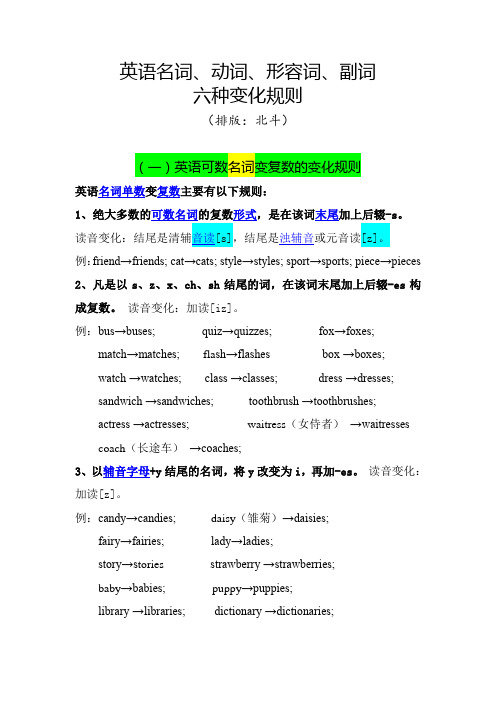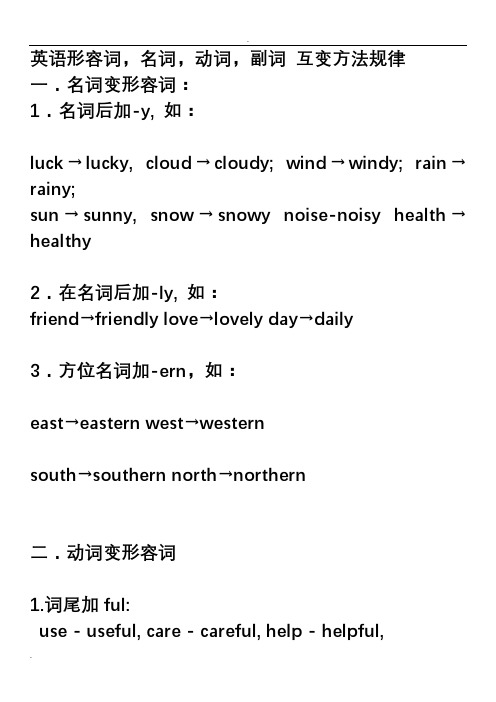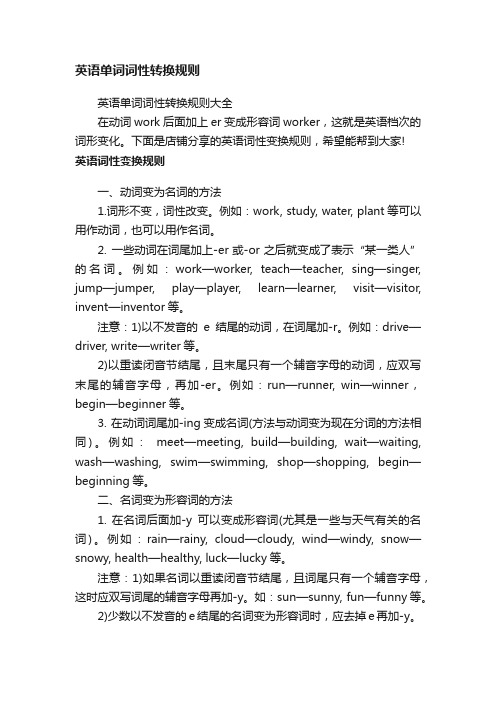英语形容词-名词-动词-副词-互变方法规律
英语单词变形的总结归纳

英语单词变形的总结归纳英语单词变形是学习英语过程中的重要部分,它包括词形的变化、时态的变化以及语法形式的变化等。
在使用英语进行交流和写作时,正确地运用单词的各种变形形式,能够丰富表达,提升语言水平。
本文将对英语单词变形进行总结归纳,帮助读者更好地掌握这一知识点。
一、名词的变形1. 单数变复数:通常在名词末尾加-s或-es,有一些特殊的变化规则,如以y结尾的名词变复数时,将y变为i后再加-es,以-f或-fe结尾的名词将f或fe变为v后加-es。
2. 复数变单数:使用the + 单数形式表示复数,或者根据上下文进行判断和确定。
3. 可数名词与不可数名词:根据名词的特性来确定其可数性,可数名词有单数和复数的区别;而不可数名词则没有复数形式。
二、动词的变形1. 时态的变化:包括一般现在时、一般过去时、一般将来时、现在进行时、过去进行时、过去将来时、现在完成时、过去完成时等。
时态的变化与动词的原形、过去式以及过去分词形式有关。
2. 语态的变化:包括主动语态和被动语态的转换。
被动语态的构成是由be动词的各种时态形式与动词的过去分词形式构成。
3. 情态动词的变化:情态动词包括can、could、may、might、shall、should、will、would、must等。
它们可以表示能力、可能性、命令、推测、义务等不同的语气,在时态和语态上有一定的变化规律。
三、形容词和副词的变形1. 形容词的比较级与最高级:形容词的比较级和最高级是表达程度和顺序的重要方式。
规则的变形形式通常在形容词后加-er和-est,而不规则的变形形式则需要记忆。
2. 副词的比较级与最高级:副词的比较级和最高级的变化规律与形容词类似,但在一些副词中需要在前面加上more或most来表示比较级和最高级。
四、其他词类的变形1. 代词的变形:代词包括人称代词、指示代词、相对代词、疑问代词、不定代词等。
在不同的语境中,代词有着不同的变形形式,如格变化、数的变化、性别的变化等。
英语的词类变化口诀

英语的词类变化口诀一.英语的词类变化口诀1.名词变复数:名变复,o与f。
即我们要特别注意词尾以o、f结尾的单词以o结尾的单词除了两人(negro,hero)两菜(tomato,potato)加es外,其余一般加s;我们还可以用这个句子帮助记忆。
Negroes and heroes eat tomatoes and potatoes,hate mosquitoes.(黑人和英雄吃土豆和西红柿讨厌蚊子)以f结尾的名词变复数,特殊情况有几个?一个农奴(serf)从海湾(gulf)来到房顶(roof)上,有了证据(proof),增加了信仰(belief),加上-s充满勇气。
贼的妻子用半片树叶和一把小刀杀死了架子后的一匹狼(thief,wife,half,leaf,knife,shelf,wolf)。
2.lie变化记忆口诀。
lie lay lain躺/lay laid laid放下;产蛋/lie lied lied撒谎,这几个词在拼写上很容易混淆,我是这样编的:撒谎最容易,直接加ed(lie lied lied);躺着很惬意,姿势很随意(lie lay lain);躺过是下蛋,一下两个d注:躺lie的过去式是lay,lay也是下蛋的意思,所以说躺过是下蛋,下蛋的过去式和过去分词都是laid,所以说一下两个d。
复习不规则动词的过去式、过去分词时也可以编顺口溜:如扑扑扑(put put put);咔咔咔(cut cut cut);嘀嗒嗒(dig dug dug)3.不规则形容词副词的比较级和最高级我们用了这样一个顺口溜:形容词副词比较级,不规则的要牢记。
合二为一有三对--坏(bad,badly,)病(ill)两多(many,much)两个好(good,well);一分为二有两个--一个"远"(far)来,一个"老"(old),还有一词是little,只记"少"来,不记"小"。
名词变复数、形容词变副词、动词各种变化规则大全

名词变复数、形容词变副词、动词各种变化规则一、名词的常见5种复数变化形式
2.特殊名词的变化
二、形容词转化为副词的规律。
三、英语动词般现在时第三人称单数形式、现在分词、过去分词变化规律。
1.一般现在时第三人称单数形式的构成
2.现在分词的构成
3.规则动词的过去式、过去分词的构成
四、不规则动词变化规律
一、AAA型(原形→原形→原形)
二、ABA型(原形→过去式→原形)
三、ABC型
1. ow →ew →own
2. i→a →u
3. 原形→过去式→过去式+(e)n
4. 原形→过去式→原形+(e)n
5. 无规律
四、ABB型
1. 原形→ought →ought
2. 原形→aught →aught
3. 变其中一个元音字母
4. 原形→□lt→□lt
5. 变其中一个辅音字母
6.辅音字母和元音字母都变
五、AAB型
六、过去式、过去分词有两种形式
七、情态动词。
小学英语素材-名词、动词、形容词、副词的六种变化规则 全国通用

英语名词、动词、形容词、副词六种变化规则(排版:北斗)(一)英语可数名词变复数的变化规则英语名词单数变复数主要有以下规则:1、绝大多数的可数名词的复数形式,是在该词末尾加上后辍-s。
,结尾是浊辅音或元音读[z]。
例:friend→friends; cat→cats; style→styles; sport→sports; piece→pieces 2、凡是以s、z、x、ch、sh结尾的词,在该词末尾加上后辍-es构成复数。
读音变化:加读[iz]。
例:bus→buses;quiz→quizzes; fox→foxes;match→matches; fla sh→flashes box →boxes;watch →watches; class →classes; dress →dresses;sandwich →sandwiches; toothbrush →toothbrushes;actress →actresses;waitress(女侍者)→waitressescoach(长途车)→coaches;3、以辅音字母+y结尾的名词,将y改变为i,再加-es。
读音变化:加读[z]。
例:candy→candies;daisy(雏菊)→daisies;fairy→fairies; lady→ladies;story→s tories strawberry →strawberries;baby→babies; puppy→puppies;library →libraries;dictionary →dictionaries;cherry →cherries;activity →activities4、以-o结尾的名词(有生命的加es,无生命的加s)读音变化:加读[z]。
例:tomato→tomatoes;potato→potatoes;zoo→ zoos;piano→pianos;photo→photos;5、以-f或-fe结尾的名词,多为将-f或-fe改变为-ves,但有例外。
英语形容词-名词-动词-副词-互变方法规律

英语形容词,名词,动词,副词互变方法规律一.名词变形容词:1.名词后加-y, 如:luck→lucky, cloud→cloudy; wind→windy; rain→rainy;sun→sunny, snow→snowy noise-noisy health→healthy2.在名词后加-ly, 如:friend→friendly love→lovely day→daily3.方位名词加-ern,如:east→eastern west→westernsouth→southern north→northern二.动词变形容词1.词尾加ful:use - useful, care - careful, help - helpful,thank - thankful peace - peaceful,forget - forgetful, play - playful,succeed - successful, wonder - wonderful2.词尾加d或ed:please - pleased, unite - united, excite - excited,surprise - surprised, organize - organized, close - closed,wound - wounded, relax - relaxed,develop - developed,appreciate - appreciated,frustrate - frustrated, interest - interested, annoy - annoyed, use - used,frighten - frightened, crowd - crowded, thrill - thrilled,pollute - polluted3.词尾加ing:interest - interesting,surprise - surprising,excite - excitingdevelop - developing,frighten - frightening,thrill - thyrillingfrustrate - frustrating,relax _ relaxing,live - livingrock - rocking,sleep - sleeping4.词尾变y为i,加ed:worry - worried, marry - married,fry - fried, terrify - terrified satisfy - satisfied5.词尾加able:know - knowledgeable, enjoy - enjoyabe,suit - suitable,adjust - adjustable, comfort - comfortable6.其它:lose - lost, fool - foolish, live - livelysleep - sleepy / sleeping / asleep,wake - awake, taste - tastyspeak - spoken, break - broken, die - dead, educate - aducational,world - worldwide三.形容词变副词规律小结例词1.大部分形容词加lycareless----carelesslyquiet----quietlydifferent----differently2.以le结尾的形容词变le为ly possible----possiblyterrible----terriblycomfortable----comfortably gentle----gentlysimple----simply3.以y结尾的形容词变y为ilyeasy----easilyangry----angrilynoisy----noisilyhappy----happilyheavy----heavilyhealthy----healthily不规则变化本身既是形容词也是副词,无需改变fast----fastearly----earlyhigh----highhard----hardlate----latefar----farwide----widealone----alone形容词和副词为完全不同的单词good----well需要去掉字母e的单词true----trulygentle----gentlyterrible----terribly虽然以ly结尾,但却是形容词,不能直接用来修饰动词friendlylivelylovelylonelyLikely有些形容词本身即为副词,同时也有加ly的副词形式。
英语单词词性转换规则

英语单词词性转换规则英语单词词性转换规则大全在动词work后面加上er变成形容词worker,这就是英语档次的词形变化。
下面是店铺分享的英语词性变换规则,希望能帮到大家!英语词性变换规则一、动词变为名词的方法1.词形不变,词性改变。
例如:work, study, water, plant等可以用作动词,也可以用作名词。
2. 一些动词在词尾加上-er或-or之后就变成了表示“某一类人”的名词。
例如:work—worker, teach—teacher, sing—singer, jump—jumper, play—player, learn—learner, visit—visitor, invent—inventor等。
注意:1)以不发音的e结尾的动词,在词尾加-r。
例如:drive—driver, write—writer等。
2)以重读闭音节结尾,且末尾只有一个辅音字母的动词,应双写末尾的辅音字母,再加-er。
例如:run—runner, win—winner,begin—beginner等。
3. 在动词词尾加-ing变成名词(方法与动词变为现在分词的方法相同)。
例如:meet—meeting, build—building, wait—waiting, wash—washing, swim—swimming, shop—shopping, begin—beginning等。
二、名词变为形容词的方法1. 在名词后面加-y可以变成形容词(尤其是一些与天气有关的名词)。
例如:rain—rainy, cloud—cloudy, wind—windy, snow—snowy, health—healthy, luck—lucky等。
注意:1)如果名词以重读闭音节结尾,且词尾只有一个辅音字母,这时应双写词尾的辅音字母再加-y。
如:sun—sunny, fun—funny等。
2)少数以不发音的e结尾的名词变为形容词时,应去掉e再加-y。
英语形容词-名词-动词-副词-互变方法规律
精心整理英语形容词,名词,动词,副词互变方法规律一.名词变形容词:1.名词后加-y,如:luck→lucky,cloud→cloudy;wind→windy;rain→rainy;sun→sunny,snow→healthy2.在名词后加-ly,如:friend→friendlylove→3.方位名词加-erneast→south→1.forget-forgetful,play-playful,succeed-successful,wonder-wonderful2.词尾加d或ed:please-pleased,unite-united,excite-excited,surprise-surprised,organize-organized,close-cl osed,wound-wounded,relax-relaxed,develop-developed, appreciate-appreciated,frustrate-frustrated, interest-interested,annoy-annoyed,use-used, frighten-frightened,crowd-crowded,thrill-thrilled,pollute-polluted3.词尾加ing:interest-interesting,surprise-surprising,live-livingrock-rocking,sleep-sleeping4.词尾变y为i,加ed:worry-worried,marry-married,fry-fried,terrify-terrifiedsatisfy-satisfied5.词尾加able:know-knowledgeable,enjoy-enjoyabe,suit-suitabl e,adjust-adjustable,comfort-comfortable6.其它:lose-lost,fool-foolish,live-livelysleep-sleepy/sleeping/asleep,wake-awake,taste-tastycational,world-worldwide例词1.2.以le为lypossible----possiblyterrible----terriblycomfortable----comfortablygentle----gentlysimple----simply3.以y结尾的形容词变y为ilyeasy----easilyangry----angrilynoisy----noisilyhappy----happilyheavy----heavilyhealthy----healthily不规则变化fast----fastearly----earlyhigh----highhard----hardlate----late形容词和副词为完全不同的单词good----well需要去掉字母e的单词true----trulygentle----gentlyterrible----terribly虽然以ly结尾,但却是形容词,不能直接用来修饰动词friendlylivelylovelylonelyLikely式。
初中英语词性转换规律总结与应试技巧
初中英语词性转换规律总结与应试技巧
1.名词转动词:
将名词转化为动词时,通常在词尾加上合适的词缀,如-ize,-ify,-en等。
例:friend(名词)→ befriend(动词)
2.动词转名词:
将动词转化为名词时,通常在词尾加上合适的词尾,如-er,-or,-ing等。
例:run(动词)→ runner(名词)
3.形容词转副词:
将形容词转化为副词时,通常在词尾加上-ly。
例:slow(形容词)→ slowly(副词)
4.形容词转名词:
将形容词转化为名词时,通常在词尾加上-ness或-ity。
5.副词转形容词:
将副词转化为形容词时,通常在词尾加上合适的词尾,如-ful,-less等。
例:careful(副词)→ careful(形容词)
应试技巧:
1.注意词根词缀的变化,有时候词性转换还会伴随着词根的变化。
2.大多数常见的词性转换规律都已掌握,但仍需多练习和记忆,积累的是经验。
3.定期回顾已学习过的词性转换规律,形成记忆,提高应对考试的能力。
4.在考试前,可以查阅常见的词性转换规律,熟悉一些常考的单词词性转换,增加应对考试的信心。
英语变形规律总结
英语变形规律总结英语单词的变形规律可以总结为以下几个方面:1. 名词的复数形式英语中大部分名词的复数形式是在词尾加上-s,例如:book-books, cat-cats, dog-dogs等。
但也有一些名词有不规则的复数形式,例如:child-children, mouse-mice, foot-feet等。
2. 动词的时态变化英语中的动词有三种基本时态:现在时、过去时和将来时。
在现在时,动词原形和第三人称单数形式是一样的,例如:I walk to school. He walks to school. 在过去时,大部分动词的过去式是在原形后加-ed,例如:I walked to school yesterday. He watched TV last night. 但也有一些动词的过去式是不规则的,例如:go-went, eat-ate等。
在将来时,动词前要加will或shall,例如:I will go to school tomorrow. They shall come to visit us next week.3. 形容词和副词的比较级和最高级形式形容词和副词的比较级和最高级形式都是通过在词尾加上-er和-est来表示的。
例如:big-bigger-biggest, fast-faster-fastest。
但也有一些形容词和副词的比较级和最高级形式是不规则的,例如:good-better-best, well-better-best等。
4. 不规则动词的变化规律在英语中,有一些动词的变化规律是不规则的,例如:go-went-gone, eat-ate-eaten等。
这些动词的过去式和过去分词形式都不是在原形后加-ed,而是需要记忆。
总之,英语单词的变形规律需要仔细学习和记忆,只有通过大量的练习才能掌握得更加熟练。
英语单词变形规律总结
英语单词变形规律总结英语单词的变形规律涵盖了很多方面,包括名词的复数形式、动词的时态和语态、形容词和副词的比较级和最高级等。
以下是一些常见的英语单词变形规律总结:名词:1. 名词的复数形式:-大多数名词在词尾加上-s,如cat - cats。
-以s, x, ch, sh 结尾的名词,加-es,如box - boxes。
-以辅音字母+ y 结尾的名词,变y 为i,再加-es,如city - cities。
-以元音字母+ y 结尾的名词,直接加-s,如boy - boys。
2. 名词的所有格形式:-一般在名词后加-'s,如Tom's book。
-复数形式以-s 结尾的名词,只加撇号,如the students' books。
动词:1. 动词的过去式:-一般情况下,在动词原形后加-ed,如walk - walked。
-以e 结尾的动词,直接加-d,如dance - danced。
-以辅音字母+ 单元音字母+ 辅音字母结尾,双写最后一个辅音字母,再加-ed,如stop - stopped。
2. 动词的过去分词:-大多数情况下,在动词原形后加-ed,如play - played。
-不规则动词需要单独记忆,如go - gone,eat - eaten。
3. 动词的现在分词:-一般在动词原形后加-ing,如read - reading。
-以e 结尾的去掉e,再加-ing,如write - writing。
4. 动词的第三人称单数:-一般情况下,在动词原形后加-s,如speak - speaks。
-以s, x, ch, sh 结尾的动词,加-es,如fix - fixes。
形容词和副词:1. 形容词的比较级和最高级:-一般在形容词后加-er(比较级)和-est(最高级),如tall - taller - tallest。
-以e 结尾的形容词,只加-r 和-st,如late - later - latest。
- 1、下载文档前请自行甄别文档内容的完整性,平台不提供额外的编辑、内容补充、找答案等附加服务。
- 2、"仅部分预览"的文档,不可在线预览部分如存在完整性等问题,可反馈申请退款(可完整预览的文档不适用该条件!)。
- 3、如文档侵犯您的权益,请联系客服反馈,我们会尽快为您处理(人工客服工作时间:9:00-18:30)。
英语形容词-名词-动词-副词-互变方法规律
英语形容词,名词,动词,副词互变方法规律
一.名词变形容词:
1.名词后加-y, 如:
luck→lucky, cloud→cloudy; wind→windy; rain→rainy;
sun→sunny, snow→snowy noise-noisy health→healthy
2.在名词后加-ly, 如:
friend→friendly love→lovely day→daily
3.方位名词加-ern,如:
east→eastern west→western
south→southern north→northern
二.动词变形容词
1.词尾加ful:
use - useful, care - careful, help - helpful, thank - thankful peace - peaceful,
forget - forgetful, play - playful,
succeed - successful, wonder - wonderful
2.词尾加d或ed:
please - pleased, unite - united, excite - excited,
surprise - surprised, organize - organized, close - closed,
wound - wounded, relax - relaxed,develop - developed,
appreciate - appreciated,frustrate - frustrated, interest - interested, annoy - annoyed, use - used,
frighten - frightened, crowd - crowded, thrill - thrilled,
pollute - polluted
3.词尾加ing:
interest - interesting,
surprise - surprising,
excite - exciting
develop - developing,
frighten - frightening,
thrill - thyrilling
frustrate - frustrating,
relax _ relaxing,
live - living
rock - rocking,
sleep - sleeping
4.词尾变y为i,加ed:
worry - worried, marry - married,fry - fried, terrify - terrified satisfy - satisfied
5.词尾加able:
know - knowledgeable, enjoy - enjoyabe,suit -
suitable,adjust - adjustable, comfort - comfortable
6.其它:
lose - lost, fool - foolish, live - lively
sleep - sleepy / sleeping / asleep,wake - awake, taste - tasty
speak - spoken, break - broken, die - dead, educate - aducational,
world - worldwide
三.形容词变副词规律小结
例词
1.大部分形容词加ly
careless----carelessly
quiet----quietly
different----differently
2.以le结尾的形容词变le为ly possible----possibly
terrible----terribly comfortable----comfortably gentle----gently
simple----simply
3.以y结尾的形容词
变y为ily
easy----easily
angry----angrily
noisy----noisily
happy----happily
heavy----heavily
healthy----healthily
不规则变化
本身既是形容词也是副词,无需改变fast----fast
early----early
high----high
hard----hard
late----late
far----far
wide----wide
alone----alone
形容词和副词为完全不同的单词
good----well
需要去掉字母e的单词
true----truly
gentle----gently
terrible----terribly
虽然以ly结尾,但却是形容词,不能直接用来修饰动词
friendly
lively
lovely
lonely
Likely
有些形容词本身即为副词,同时也有加ly的副词形式。
但加不加ly意思不一样,使用时需注意
wide(形容词,宽阔的,睁大的)----wide(副词,睁大地)/widely(副词,广泛地),
late(形容词,晚的)-----late(副词,晚地),lately (最近)
high(形容词,高的)----high(副词,高地)/highly(副词,高度地)
特别容易犯错的副词
形容词-----副词
备注
hard副词容易写成hardly, hardly意思为“几乎不”,与hard无任何关系
friendly
不能用friendly直接修饰动词,只能改成in a friendly way“用一种友好的方式”。
如:
He smiled at me in a friendly way.
Excited------excitedly
容易拼错
Healthy-----healthily
容易拼错
Polite-------politely
不用去掉字母e。
类似的词还有:widely, nicely, closely,。
